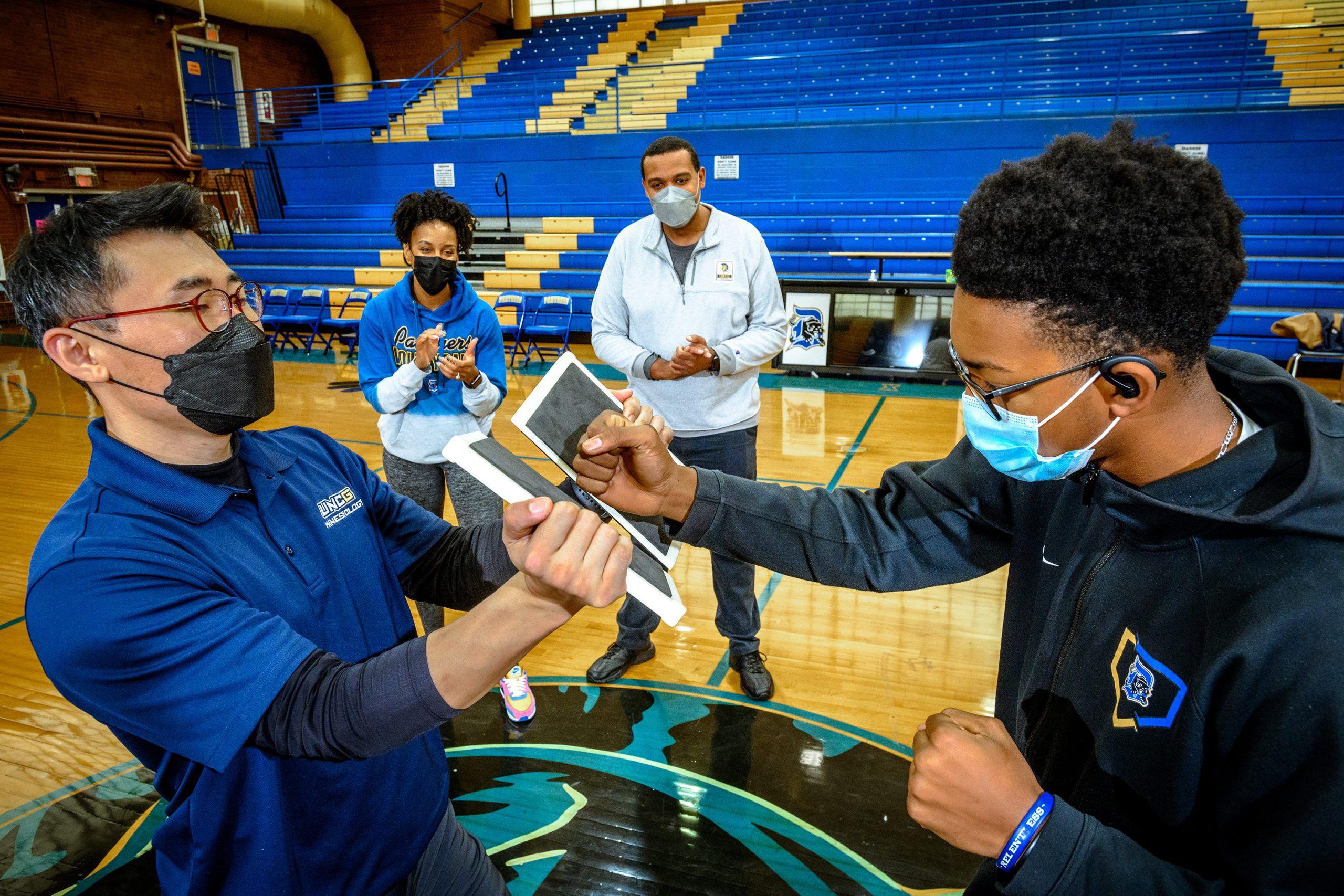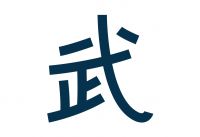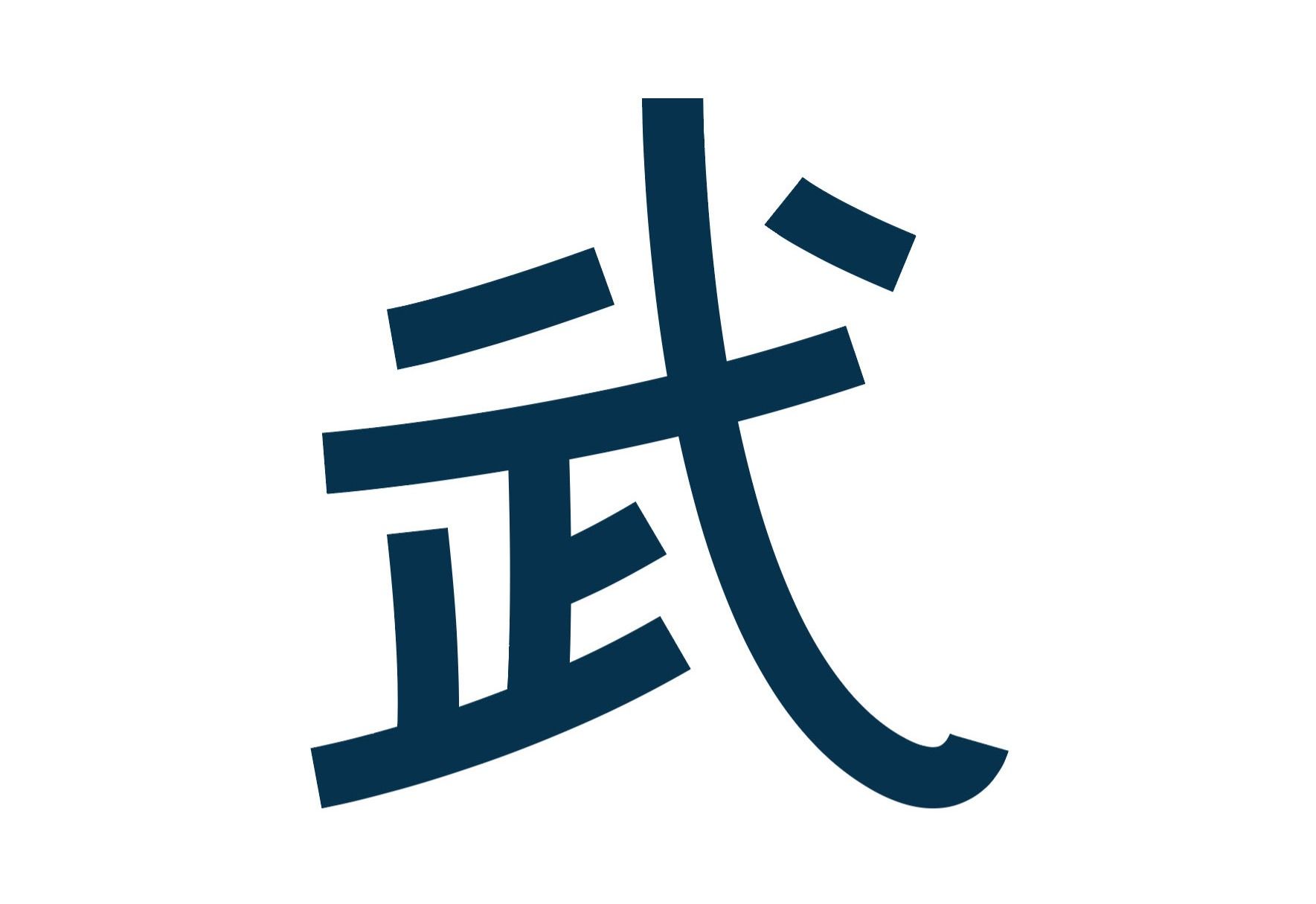A rare moment of quiet falls over the dozen Dudley High School freshmen seated in a circle in Coach Mitchell’s physical education class. It’s Tuesday, so the class is being led by UNCG’s Michael Hemphill, Jeremy Rinker, and Omari Dyson.
Rinker, an associate professor of peace and conflict studies, has asked the students to share an example of a hero in their lives.
“My mother,” the first student answers. “She works and then comes home and cooks us dinner.”
As they move around the circle, each student has a chance to share. The goal is to build trust, so everybody feels safe, respected, and included. “At the start of each year, most people aren’t comfortable sharing, but over time, as we build relationships, they trust us and each other enough to open up,” says Rinker.
These relationships are foundational to the practices of restorative justice – a collaborative and peacemaking approach to conflict resolution.
This is the final year of a three-year curriculum designed by Dr. Hemphill, Dr. Rinker, and Dr. Dyson to introduce restorative justice to Dudley High School students.
“Communities in Schools is a dropout prevention nonprofit that is embedded in schools five days a week,” Hemphill explains. “Through our contact with them, we found that a lot of Dudley students were ending up at in-school suspension. Our partnership with Communities in Schools and Dudley High School aims to change the school climate from punitive to restorative, so kids feel safe and like they’re part of a community, even when they make mistakes.”
Ultimately, Hemphill says, this assets-based approach, which builds on the strengths and perspectives of children in the community, should reduce suspensions and dropouts and help students develop conflict resolution skills they will take through life.
Restorative justice’s values could be taught in any class, but Hemphill, an associate professor of kinesiology, realized a golden opportunity in the PE elective. “To graduate from high school in NC, you have to take health and PE, and our state’s essential curriculum standards prioritize teaching conflict-resolution skills,” he says. “Students typically take PE in the 9th grade, so over the course of a few years, you can impact an entire high school.”


A Dudley High School senior practices taekwondo with doctoral student Yongsun Lee, as Coach Darlene Mitchell and Dr. Michael Hemphill look on. Lee came to UNCG from South Korea, to study kinesiology and youth sport development.
“During partner drills, students can check if their partner is ready to hold a punch or kick pad before starting, and punch and kick more strongly only with their partner’s permission,” says Lee. “Knowing how to interact with others in positive ways is an essential factor for peace.”
The three-part class meets twice a week. After circle time, students work with Yongsun “Sun” Lee, a doctoral student and taekwondo instructor, to practice the restorative values they’ve learned while they learn taekwondo fundamentals. “I emphasize bowing to partners before and after drills as a way to show respect and trust,” Lee says. “And I ask students to share the ways they show respect in school, home, or community – and in physical education.”
Lee points out that, while many Westerners think of martial arts as the art of fighting, the Chinese character “wu” (seen here), which is often translated into the word “martial,” means to put down weapons. “The true meaning of martial arts practice is to seek peace by knowing how opposite forces, like peace and conflict, can be interrelated.”

The class ends with a final, more informal circle where students give a shout-out to others who exhibited values they talked about. “The second circle ensures we’re hearing the perspectives of everybody – the loud kids and the shy kids,” Rinker says, and it verifies the kids’ understanding of new concepts.
In a recent article published in the Journal of Teaching in Physical Education, the researchers identified pedagogical strategies that were effective. These included “listening, building community, and healing circles in response to interpersonal and structural conflict or harm,” Hemphill says. Success was tracked by documenting how students connected the lessons they learned to other aspects of their lives. “Transfer is the important thing – when young people take these values beyond the context of PE and apply them in their school, communities, and homes.”
Darlene Mitchell, who heads up Dudley’s PE department, believes these restorative justice practices are especially important as the students return to school following the pandemic. “COVID has done a number on these kids, mentally. They hold a lot of things in, and they don’t trust just anybody,” she says.

“When kids keep things bottled up, the smallest conflict causes them to explode. This program has given them a space where they feel comfortable opening up.”
The class meets in the last academic period of the day. “During fourth block, it’s hard to keep their attention,” Mitchell says. “I’ve seen a major difference in how students responded during this class. Kids have really taken to it, and they’re engaged and respectful. When I step in to observe, I notice that the students are expressing themselves. I absolutely love it.”
As their UNCG-funded project comes to a close, Rinker, Hemphill, and Dyson are pursuing opportunities to scale their curriculum to other schools.
“I wish every high school kid could take this class,” says Mitchell. “When students don’t understand or know how to handle conflict, it’s difficult when they become adults. Now, when they graduate and go out into the real world, they’ll remember what they learned.”
Learn more
restorativeyouthsports.uncg.edu
Article by Robin Sutton Anders
Photography by Martin W. Kane
- Office of Research & Engagement
- UNC Greensboro
- 1601 MHRA Building
- 1111 Spring Garden Street
- Greensboro, NC 27412